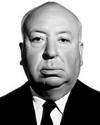Alfred Hitchcock
Top 10 villains

What it boils down to is that villains are not all black and heroes are not all white; there are grays everywhere.
Antagonists always played an important role in Hitchcock movies. After all, they were supposed to be scary and make the audience hang on to their seats as if their lives depended on it. Alfred's numerous villains helped in making that happen.
While at it, he pretty much reinvented the role of a bad guy. Up to his time, outside of experimental cinema, most anti-heroes were one-dimensional characters. Hitchcock introduced that cherished complexity.
His bad men could be exposed and visible, but could as much be surprising reveals. We often did not know what to expect. The director avoided stereotypical obvious dark and twisted evildoers. Instead, Alfred was serving deviants we felt sorry for, were confused about, or did not know what to think at all. Each one was captivating in his own way though and most were strangely appealing.
Below is a list of the ten most interesting ones of them all.
The General / Secret Agent
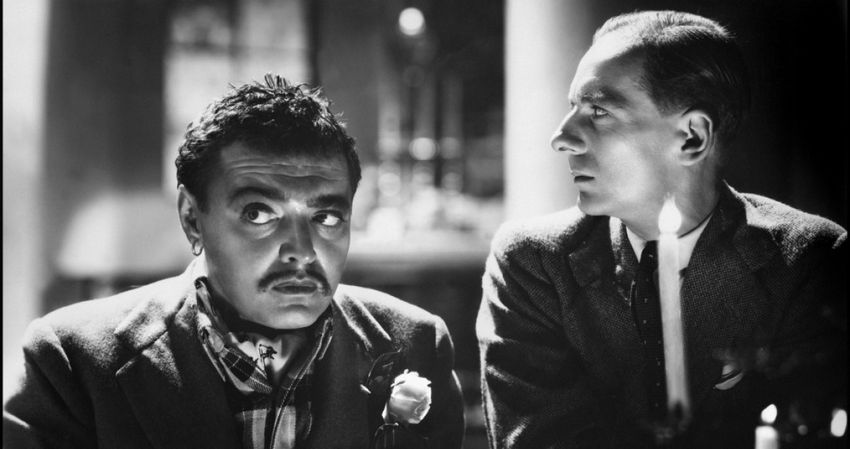
Peter Lorre was someone Hitchcock just couldn't pass up on. The director was known for his antagonists, and so was Lorre! It was a match made in heaven... or some other place.
They cooperated twice. First was The Man Who Knew Too Much in 1934, and then two years later was Secret Agent. The first one was a bit more interesting piece of entertainment, but Lorre was magnificent on both occasions and probably more striking in his second performance.
In Secret Agent, he plays General Pompellio Montezuma De La Vilia De Conde De La Rue, or so is the way his character introduces himself. He is part of a spy trio, sent to locate and assassinate a target.
General couldn't ask for more boring companions - both John Gielgud and Madeleine Carroll play main roles which are really background characters, giving way to Lorre the moment he appears on screen. Their personalities are dull, one-dimensional and predictable, looking like an anti-commercial of all things normal.
Lorre provides a needed colorful contrast to the main protagonists - he claims to be of exotic origin, has child-like qualities, is friendly and lively. However, all the time (and here comes Peter's genius) there is this slight undertone that something is not quite as it seems with him.
The ending of the movie reveals just how much he goes off the scale, but even then he manages to be so incredibly charming that the viewer feels for him.
Unfortunately, neither of the two mentioned Peter Lorre pictures were particularly great, but the talented actor's performances carried them and are good enough reason to check them out if you haven't had a chance to. Of the two villains, the one in Secret Agent gets our vote.
Torn apart by excruciating gallbladder pains, Lorre suffered from morphine addiction and his mental condition followed. A wild gun on the set, when the film started rolling, he was nevertheless one of the best at his craft and this picture is a great proof of that.
Norman Bates / Psycho
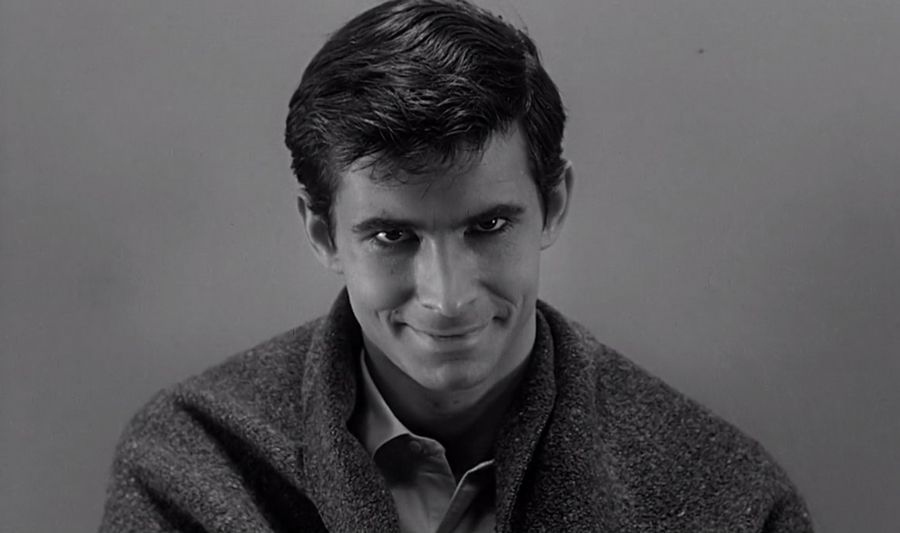
Just like with Peter Lorre films, here again the background character is cast at the center of things. In the meantime, main protagonists come and go, which was something unthinkable at the time, yet Hitchcock pulled it off with ease.
Norman Bates is mama's boy. He seems like he wouldn't harm a fly (or at least his mother wouldn't), but behind that facade hides terrible darkness.
After killing his own mother, Norman's guilt triggers Multiple Personality Disorder. He brings his mother back to life as an alternate person, living within his mind and at constant conflict with the fragile boy.
Personally, Hitchcock questioned psychoanalysis as an effective way to tackle the human psyche and took jabs at the profession both privately in interviews as on the screen (Spellbound), but some of his movies contain plenty of influences from the field, and of them all, Psycho is his most mature creation.
Perkins created probably his most disturbing villain, which was quite an achievement! The picture was so powerful and influential that after finishing it, Bates was showered with evildoer role propositions, while all other kinds were completely gone. The producers assumed the public will find it hard to tolerate the normal Perkins, always assuming that his character is about to stab someone anytime soon.
They were probably right, but given that Anthony became the central characters in the most popular movie of one of the most talented directors to ever grace the Earth, it was still a small sacrifice to make.
Privately, the actor was no stranger to psychotherapy. Back when people still thought that sexual preference is a condition of the mind, he undertook a prolonged therapy to stop being homosexual. Later, he married and had two kids.
Bruno Antony / Strangers on a Train
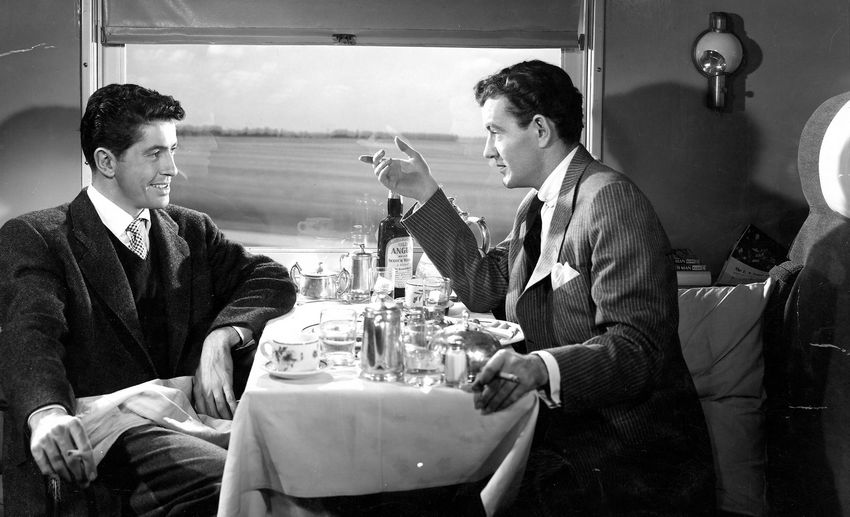
In Strangers on a Train, Farley Granger plays Guy, another understated protagonist that, despite being a stand up Guy and a success story, somehow fails to evoke any positive emotions in a viewer.
The glamour is stolen by Robert Walker, another humble boy loving his mother, with magnetism, charm and gentleman-like qualities.
In a train conversation between the two, Walker's character Bruno discovers that he and Guy have something in common - they both want someone in their lives to be gone. While Guy is just saying it, Bruno overinterprets things (or pretends to do so) and carries out his part of the "deal", killing the protagonist's wife.
He then comes back to Guy's life, demanding that it is his turn to act. When Guy panics and tries to brush the bad guy off, things get nasty as Bruno is not going to let it go.
Robert Walker was a wild card from the start. He wasn't a particularly known actor, and people who knew who he was had a completely different image of Robert in mind. On top of that, he was an alcoholic struggling with a complicated personal life.
Luckily, Alfred Hitchcock was a master of casting against type, being able to spot qualities necessary to succeed in his movies from a mile away. Bruno was the main attraction of the film, and despite the movie being about finding a way to neutralize him, the director constructed Bruno in a way so that (again) the audience almost wants him to get away from the mess that he put himself in.
Only nominated for one Oscar and with zero won awards to its credit, Strangers on a Train is nevertheless one of Hitchcock's finest movies. And so is Robert Walker's performance one of the most captivating to be seen in any of them.
Brandon Shaw / Rope
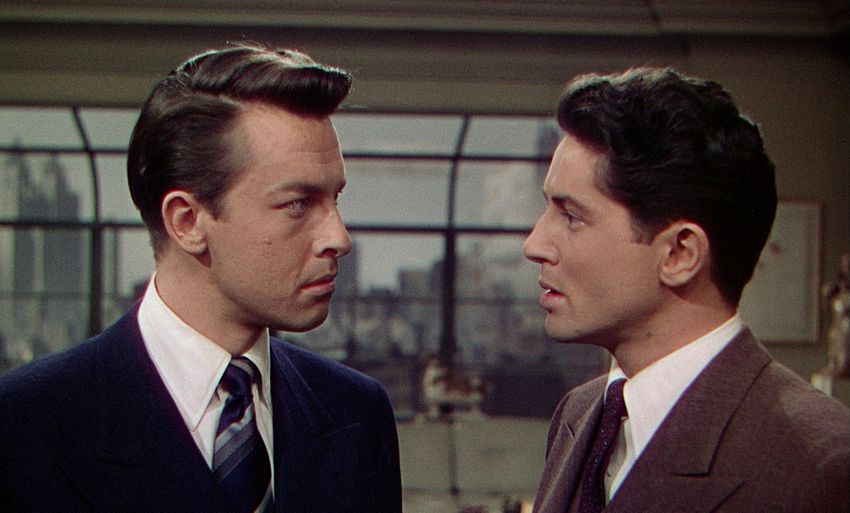
An adaptation of Patrick Hamilton's wonderful play, Rope tells the story of two disturbed friends in an unusual situation.
Brandon and his pal Philip (played by John Dall and Farley Granger) decide to murder their common friend David, and do so quick - he is strangled in the first scene of the movie (a super-rare occurence back in those times). Then, they decide to take things even further and hide the body in a giant box, which is to serve as table in an upcoming large home party.
Here, the two evildoers are not likeable monsters pretending to sit in the background - they are right there at the front of action. And they are not likeable by any stretch of the imagination! In other words, a complete reverse of Hitchcock's usual.
The reasons for killing are absurd. Since the two male friends are far more intelligent, they consider themselves superior to average David, and so they believe they need not be shackled by morality, which was invented for sheep (like David) to follow. What is his life worth compared to these two geniuses? And so they sacrifice him on the altar of their vanity.
In reality, they kill to start feeling superior, not because they felt so before. Playing God by erasing another human being from this planet is a rush that they are seeking, and the need to feel smarter than everyone is to be satisfied by setting up their environment to get caught (by organizing a party with dead body at the center) and getting through it without a scratch. They are so good that nobody can touch them.
The dissonance between the two friends is one of the best things about this picture. John seems to be the mastermind behind the plan, while Patrick is enchanted by the idea mainly because he lacks strength of character and is easily swayed.
But as the heat gets stronger, Philip becomes increasingly panicky, which exposes the fact that deep inside he is a normal, albeit confused person, tormented by what he had done and terribly scared of getting caught. These same events show John going in the opposite direction - he is not temporarily mentally stunned, he really is a psychopath meaning every word he says to Philip!
As the time goes on, John reveals himself to be the devil incarnate that needs to be stopped. Here, James Stewart's character steps in.
Mrs Danvers / Rebecca
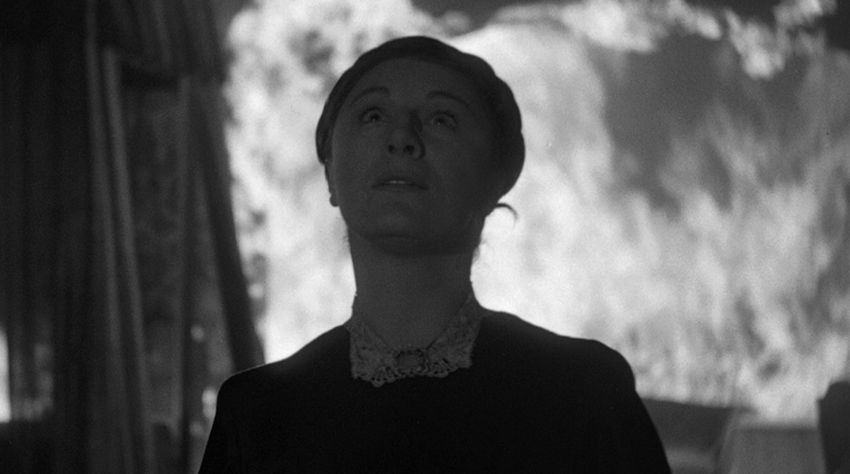
Rarely in Hitchcock's most acclaimed movies a villain is instantly marked, enabling the audience to identify the person as a black sheep right from the start. Rebecca is one of the exceptions from the rule.
In this picture, Judith Anderson plays Mrs Danvers, service staff at Manderley - a beautiful villa where Mr and Mrs de Winter lived together until Mrs died under mysterious circumstances.
Now, a new woman enters Maxim de Winter's life, and cherishing her beauty, girlish innocence and positively awkward simplicity, he intends to make her his second wife. And so she is brought to live by his side at Manderley before they even get married.
From day one, she finds the new place too big for her low self-esteem. Mrs Danvers, a serving staff member instantly identifies Rebecca's weakness and decides to mentally bully her into madness, so the new girl leaves, no matter if she does so through the door, or through the window.
The audience might expect the relationship between the two women to warm up with time, as Rebecca would fight to make Manderley her new home, but the opposite happens in the film. We see how hellish and determined Mrs Danvrs is and also get a good look at her motives.
As it turns out, she was in love with Mrs Danvers and glorified her the same way brainwashed person glorifies a cult leader (despite the fact that, as it turns out, Mrs de Winter was no saint at all).
This unhealthy obsession is so strong that it carries past the death of her beloved, and when an awfully fragile understated figure comes as her substitute, Danvers sees no other way than to crush her, so her idol's memory and what's left of her possessions in this world remain undesecrated.
Every main role in this picture is played perfectly, and Judith Anderson's psychopath is extremely intimidating, portraying the devastating effect that obsession and jealousy can have on people. It earned the actress her only Oscar nomination (one of ten that the picture received).
Rebecca was Hitchcock's first U.S. movie, and one that instantly established him among the elite filmmakers in Hollywood.
Uncle Charlie / Shadow of a Doubt
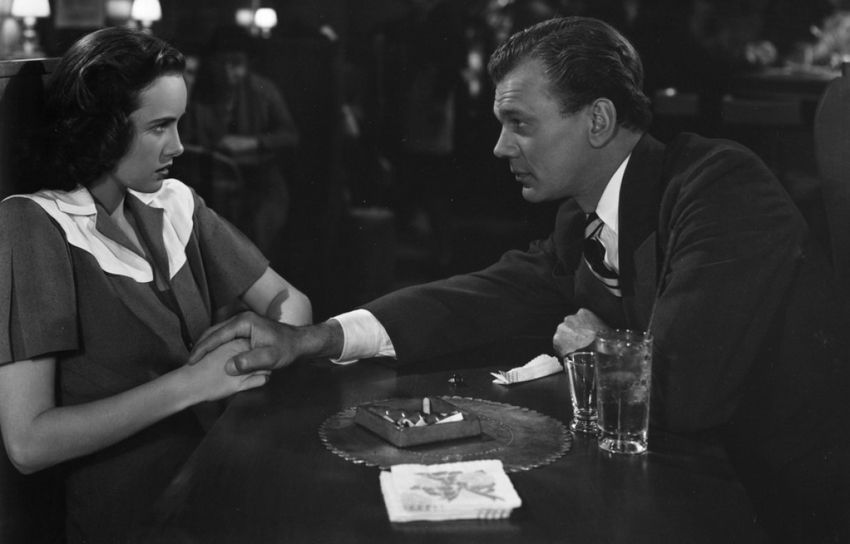
Shadow of a Doubt is one of Hitchcock's greatest works. It is the director's favorite work of his, but the picture didn't meet with equal enthusiasm from critics. Some time had to pass before they started appreciating it.
The film disappointed in that it wasn't very Hitchcockian, but that's one of the reasons why it is a gem among Alfred's works.
There are two main characters in this picture, actually, or it is uncertain who has the leading role) - young girl named Charlie, or her uncle - also Charlie. The common ground between them goes much further than just the name.
Charlie is a young, bored with life, but enthusiastic girl. She carries with herself more energy than her hometown is capable of absorbing, so she's bored. Desperate for entertainment, she is extremely happy when finding out that her favorite uncle is coming to town.
The older Charlie in the family has big world written all over him. He is the definition of fun for young Charlie. This is not all, though. The connection between them goes much deeper than logic can axplain.
The problem is that her uncle has a terrifying secret, which, when his niece finds out about, is about to shake the foundation of their relationship. The picture is great in that it very realistically explores how deep bond can be affected by a traumatic discovery.
Joseph Cotten is all gold in the role of uncle Charlie. First, he is in love with his niece as much as she is in him, but the change in her attitude towards him triggers the man's sociopathic tendencies to the point when they take over and all the feeling is gone on both ends.
Uncle Charlie is a madman sitting as close to the classical psychopath model as you'll find in any of the Hitchcock movies. Functional, seemingly empathetic, talkative, charismatic, but in reality deeply dysfunctional, narcissistic and with no regard for life other than his.
The feeling for Young Charlie is the only thing that seems to separate him from complete darkness, but even that proves to be a facade.
Bob Rusk / Frenzy
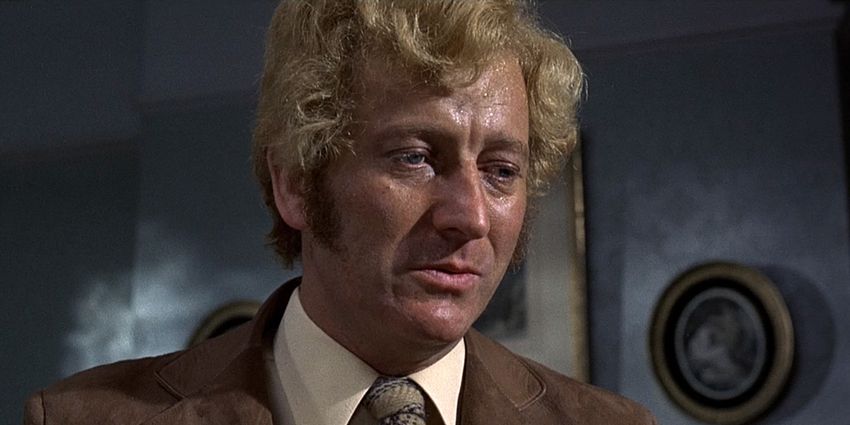
Frenzy is one of Hitchcock's last movies and one of his least satisfying ones. It stays very true to Hitchcock principles, but the way everything is presented is rather cheap. Still a decent movie, but people hoped for more from the man, hence the disappointment.
In it, Barry Foster plays Bob Rusk, a small time businessman whose main hobby is strangling women with neckties. His friend, the main protagonist, is Richard Blaney. The latter gets wrongly accused of killing his ex-wife and also his current girlfriend. He becomes the classical Hitchcockian man on the run trying to prove his innocence.
The irony of the situation is that Richard turns to Robert and gets help, even though Bob is the back stabber who put him in this situation in the first place and is just playing him.
Frenzy is different in the way it portrays a serial killer. Looking at his character alone, it's easy to compare Bob with Uncle Charlie from Shadow of a Doubt. But the way he is presented is completely different.
Whereas in most of Alfred's movies the villain is an other-worldly person, someone so disconnected from what is considered normal that he becomes sort of a mystic, diabolical figure (take Norman Bates' last look, for example), here the killer is presented as nothing more than an animal.
Rusk is shown as something below some elemental level of human dignity, completely consumed by his primitive urges. He seems like a sympathetic man at first, but when his true nature is zoomed onto, no shred of sympathy is left.
Inside the Hitchcock circus, he probably remains the most antipathic and loathsome evildoer the director has ever created. This impression is so strong that it makes the audience uncomfortable. The problem is enlarged by Hitchcock indulging in Rusk's murders in the greatest details, which makes the movie harder to watch.
It's the one Hitch killer so ugly that you don't want to take a peek at all. Here, the director shot himself in the foot.
Alexander Sebastian / Notorious
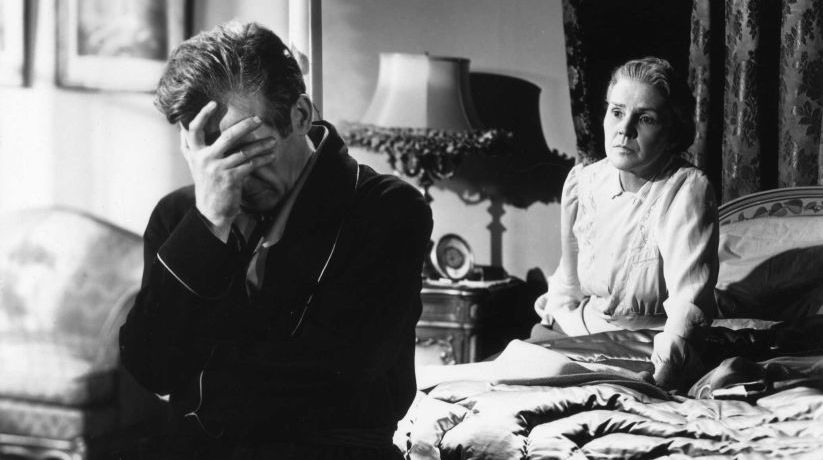
Notorious is one of Alfred Hitchcock's most acclaimed pictures. It is unique, in that here the villain really sits in the background, as in front we have two top tier Hollywood stars: Ingrid Bergman (as Alicia) and Cary Grant (as Devlin) which are not about to give way to a secondary role.
The feeling between them is the central theme of the movie. The daughter of a dead German nazi spy is convinced by an FBI agent to take part in operation, whose target is her father's old nazi pal who hasn't got the memo that the war is gone, and has plans to continue the work of Adolf Hitler.
This friend is Alexander Sebastian, played by the ever-classy Claude Rains. It so happens that Alexander used to be in love with Alice, so the FBI wants to use that angle.
The problem is that as Devlin and Alicia spend time with each other, they madly fall in love. This is problematic - Alicia is put in the lion's den and Devlin cares about her safety. Does the operation take priority, or do their feelings?
As much as Alexander stays in the background of things, he is superbly played by Rains and is an enchanting character. He is gentle, friendly and a bit childish. As he falls in love with Alicia again, it can be seen that he really wants her best and cares about her.
When introduced to his human side, the viewer wanders: how is it possible that such a person is part of a terrorist organization, let alone its leader?
The answer is Alexander's mother. Looming in the background, she is the true villain of the film. Sebastian is like a fly that got trapped in a spider's web. His mother envenoms his mind and with minimal effort steers him just where she wants her son.
In that way, Alexander is a little bit similar to Farley Granger's character Philip in the picture Rope. But while Philip's discomforts grow the longer he is in a position which is not his natural one, Alexander is at peace even with a perspective of killing his wife, as long as it is what his mother approves. That is because his conscience lies at her feet.
Poor Alex!
Lars Thorwald / Rear Window
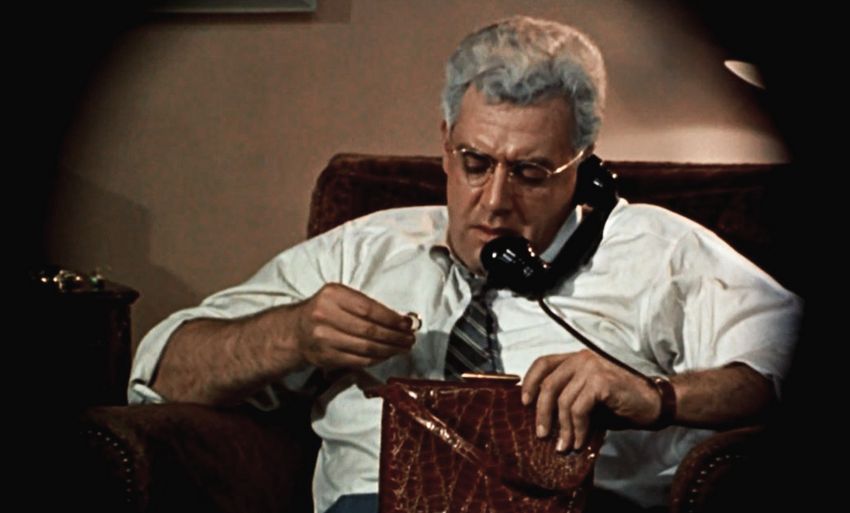
Rear Window is a arguably Hitchcock's most loved worked, even though it's unique in many ways. And the biggest of them all is the subject - voyeurism.
L.B. 'Jeff' Jefferies (played by the same James Stewart who outsmarted main prota/antagonists in Rope) is bored with his life, as his leg is broken, which enchains him to a wheelchair. Not knowing how to entertain himself in his apartment, Jefferies starts watching through his rear window to fill the emptiness in his life with daily activities of others.
Watching one of the neighbours, he makes a terrifying conclusion - from the facts gathered, it looks like Raymond killed his wife! Obviously, his theory doesn't sit well with his fiancee, but with time he gets to find out that his assessment is true.
Raymond Burr plays Lars, a mysterious man in question. His role is unlike any other in a Hitchcock movie, and particularly among the director's villains. Because he is observed from a distance and he lives... alone, he doesn't speak. Everything has to be read from his actions, his gestures, his mimicry.
Even though Thorwald has some stone cold seriousness about him, he remains largely neutral throughout the movie. Whether he looks more like a bad guy or like a good guy depends on if the viewer bets that he did, or he didn't do it.
Confrontation with him reveals a more familiar villain face and Lars' visit to L.B. is one tense scene!
Jonathan Drew / The Lodger
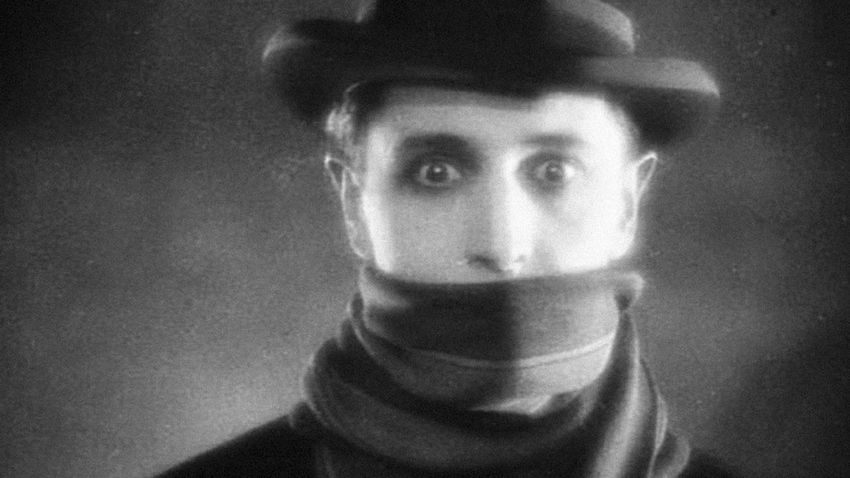
This movie established Alfred Hitchcock as one of the most promising directors of the young generation at the time and opened many doors for him.
Its main attraction was Ivor Novello, a big star of the silent era and an object of desire for women of all ages. This was a big problem for the picture - would casting him as a shady character tarnish his reputation and affect his popularity and the kinds of jobs he will get, vide Anthony Perkins? His representatives thought so and considered this project a gamble for their commodity.
In this film, Ivor is not as much a villain as a suspected one, and Hitchcock plays one of his early major tricks on the audience.
A man checks in at the London motel at a time when the whole town talks about another victim of a serial killer called Avenger, who goes hunting for blonde girls at nights.
On the ground floor lives a very normal family, occupied by earthly matters known to us all. The new tenant stands in sharp contrast - he is pale almost like a dead man, has weird body posture, wears peculiar clothes, avoids eye contact as if he'd have something to hide, and more.
Everyone quickly becomes suspicious for everybody except the young girl, who somehow finds common tongue with him and they even get close to being a couple. Is she walking into a trap? Is this a mistake that will ultimately cost the woman her life? Her relatives wonder.
Practically everything in the movie suggests that it is so, except that it isn't. Novello does wonderful in portraying a typical villain, but only for Hitchcock to say: not on my watch! The director would never go for the obvious, unless the obvious was what the audience least expected.
In 1927, an average cinema attendant's thought process was that Drew is the man the police are looking for, so Alfred proved them wrong, and Novello helped him do it.
